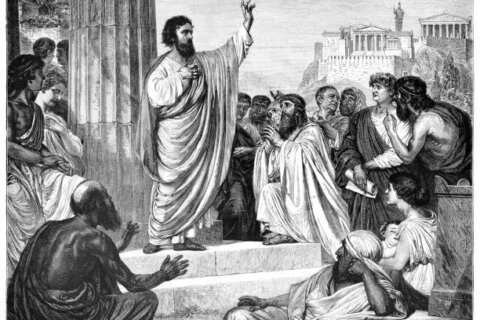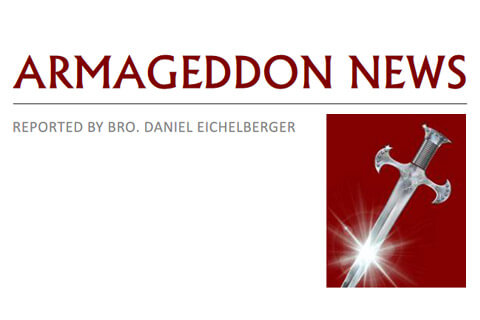The Corinthians were instructed to sing with the spirit and with the understanding. Christ, being unashamed, was pleased to declare the name of His Father unto His brethren according to the prophesy saying, “In the midst of the church will I sing praise unto thee.” To him who is merry, James says, “Let him sing psalms.” Whether we are speaking of Jesus and His disciples after the ordinance of feet washing and the Lord’s supper singing a hymn, or the earth-shaking midnight duet of the holy prophets Paul and Silas, the absence of musical accompaniment is very apparent.
It is true that the use of musical instruments was permitted under the old covenant, though from the beginning it was not so, for the two silver trumpets are the only ones we read were expressly ordained of God to Moses, and these were not used to accompany the singing (Num. 10:2). It is very clear that David made and used instruments for worship. While we make no attempt to discount this fact, we must also acknowledge that outside of the symbolic book of Revelation, which we will address later, there is not to be found a single reference showing instrumental accompaniment with singing in the New Testament.
Though this is the case, it is not merely, or even primarily, the absence of musical instruments that impels us into the understanding that their use as accompaniment in worship is extra-biblical. It is chiefly the commandment for the presence of a far superior accompaniment, the reality of which was unrealized during the time of the old covenant in the manner that the church presently enjoys.
The present day standard regarding this subject is set before us in language that is direct and easily understood in the epistles to the Ephesians and the Colossians. “Let the word of Christ dwell in you richly in all wisdom; teaching and admonishing one another in psalms and hymns and spiritual songs, singing with grace in your hearts to the Lord.” Col. 3:16. “Speaking to yourselves in psalms and hymns and spiritual songs, singing and making melody in your heart to the Lord.” Eph. 5:19.
These commands are not given exclusively to a single individual, but to all of the saints and faithful brethren in Christ at each location and consequently to all the saints in the gospel dispensation. God’s Word was to have the preeminence in and among the brethren at large. His Word was to live in, walk in, and order the steps of the congregation in every way. The whole counsel of God was to be preached, enforced, and lived until the rivers of living water flowing out of each heart made wise through salvation flowed together in a mighty current of love as the saints assembled together to worship the Lord. From this good treasure in every heart and happy state of affairs, the saints were to lift up their voices in praise to God and speak one to another in song.
Jesus said, “But the hour cometh, and now is, when the true worshippers shall worship the Father in spirit and in truth: for the Father seeketh such to worship him. God is a Spirit: and they that worship him must worship him in spirit and in truth.” John 4:23-24. Worship means to adore or reverence by putting oneself down. This goes far beyond saying, “We worship you God; we adore you!” for this cannot be done by anyone who has not gotten down low before God.
Worship cannot be accomplished by a congregation that is in competition to see who has the flashiest suit or shoes or hat or hair style. It does not take place with lifted hands that are heavily ringed with jewels and diamonds. It cannot be done by the singers who love to hear the sound of their own voice and equally love to collect their hire after (or before) the show. True worship is not taking place just because the musical arrangement is in good order, pleases the ears, and people are impressed. When these things are paramount, true worship cannot be present, for it can only be accomplished in the very spirit of abasing oneself or getting down low that He may be lifted up.
True worship must also take place in truth. Our Lord does not say, “in sincerity,” but, “in truth,” for one may be sincere, yet be in gross error. Being in possession of an experience of salvation which has raised you above all sin to sit together with Christ and all of the redeemed in heavenly places is essential for true worship to take place. A sinner cannot worship God, for to worship Him, a person must be one who does His will, and it is not His will that we sin. “Now we know that God heareth not sinners, but if any man be a worshipper of God, and doeth his will, him he heareth.” John 9:31. We must therefore worship God in truth, or with a true heaven-born experience of salvation, as well as in the true and living doctrine of the Lord Jesus Christ which produces such an experience. The Father was seeking those who would worship Him who adhered to no false doctrine and were set free from the encumbrance of denominational ties and policies which create walls separating His people. God also required more than just the no-name community churches, non-denominational and inter-denominational churches of the present day with their ecumenical show of acceptance and tolerance to every belief system except God’s demand for sinless living. The true worshippers whom God sought were found in His New Testament church!
The apostle commanded the Colossians to allow the truth of the doctrine of Christ to corporately dwell in them. What ensued were songs full of truth which were able to teach and admonish.
Teaching is instructing or informing another of knowledge of which he was before ignorant, including bringing again to the mind that which has before been taught. To admonish is to caution and warn the believers to a carefulness that will help them to continue in all of the truth of the Word of God which has been preached among them and wherein they are established.
The singing of the saints was a result of allowing the Word of Christ to richly dwell in them, as well as a means of allowing the Word to continue to live among them. That same sin-shattering gospel that was preached of Paul was to be continually spoken in song among the people of God. Indeed so synonymous was the singing with the preached word that the songs were able to be studied as lessons. They were able to give sharp warnings and rebukes to all present. The singing was helping to keep the saints in the way of truth and to bring any visitors under conviction by showing them their pride, hardheartedness, and the folly of their life of sin.
The types of songs to be sung are psalms, hymns, and spiritual songs. The Psalms which are here referred to are those of the Old Testament. The word used for hymn in the original language means to celebrate. It is, in its most technical meaning, a religious ode celebrating the one true God and the victory He has given to us. As we have discovered, this may only be done in the truest sense by a heart made pure by the redeeming blood of the Lord Jesus Christ. Spiritual songs are simply songs that are non-carnal by their nature, which deal with the regeneration experience and direct the heart and mind to the supernatural workings of God, most of all in salvation through His Son Jesus Christ.
It is at this point that some believe that instrumental accompaniment is called for in the New Testament, saying that the word psalm means to twitch or twang, as on a stringed instrument. But in the time of the early church, psalms was also understood to mean simply singing. See Thayer’s Greek for 5568 and 5567.
Those who think it is not possible to sing psalms without some sort of instrumental accompaniment may ask, “Where is your musical accompaniment? The psalms were set to music and we must have it so to truly worship God.” In the Old Testament, psalms were often accompanied by instrumental music, but now we are commanded to have singing, “with grace in your hearts to the Lord.” Col. 3:16. In the Old Testament, melody was made with tambourines and other musical instruments. In the New Testament, the melody is made in the hearts of believers: “Singing and making melody in your heart to the Lord.” Eph. 5:19.
Here the phrase, “making melody” is translated from the exact word (Strong’s #5567) from which the word psalm is taken in this and the previous text in Colossians. That word again can mean to sing, or to rub or touch the surface, to twitch or twang, that is to play on a stringed instrument. “Speaking to yourselves in psalms and hymns and spiritual songs, singing and making melody in your heart to the Lord.” This does not speak of skilled human hands touching any instrument to produce a beautiful sound. It speaks rather of the expert hands of Jesus Christ touching the human heart and creating a sound which is not possible to be played by human hands.
We therefore forfeit and forever renounce all musical accompaniment for that which is divine in and through the saints by the gift of the grace of God. The New Testament standard is, “Singing and making melody in your heart to the Lord.” We therefore see and know that outward man-made musical instruments are excluded and replaced for the far superior accompaniment of grace in the depths of the soul.
This is symbolized in Revelation 14 when John saw and heard the voice of harpers harping with their harps. This can only be interpreted as a view of all the saints standing with their Lord, having the grace of God through salvation in the depths of their hearts which enables them to sing “a new song…and no man could learn that song but the hundred and forty and four thousand, which were redeemed from the earth.” This is a song that none but the saved know, not the old song of the Old Testament, but that which is new through the saving grace of God.
This is music that no mortal can play, for the chief musician is Christ and His instrument, the redeemed. He knows where to touch and where to pluck the once broken heart strings and cause it to make such a sound that John Newton felt it, heard it, and wrote, “Amazing grace! how sweet the sound that saved a wretch like me! I once was lost, but now I’m found; was blind, but now I see.”
The accompaniment of the grace of God embarrasses (if it were possible) pianos and all man-made instruments. And what highly trained maestro or conductor, what musician possesses the ability to take up his abode inside of his own created instrument and both sing and play from the inside of the instrument out? What musical instrument is suitable, and who may be so bold as to say that they will assist such a maestro with his ode of grace? Can any sinful instrumentalist even approach the arena where the holy, harmless and undefiled Master of ceremonies is engaged in His flawless and absolute mastery of the music of which He is the originator? No! Let all musicians, though skillful they may be, blush and not venture to interrupt such mastery which is the grace of God lived out and then sung out through Jesus Christ.
Let none fear that we are attempting to introduce a new and unorthodox belief. We are not the first to hold that musical instruments have no place at all in the worship of God.
The early church fathers opposed instruments of music in Christian worship:
Justin Martyr (ca. 150 AD) condemned any association with musical instruments as worldly.
Tertullian (150–222 AD) mentions only vocal music in worship.
Clement of Alexandria (200 AD) severely denounced the use of instruments among Christians even at banquets.
Gregory of Nazianus (330–390 AD) mentions instruments, but not in any way to approve them. He believed their only use was the arousement of sensuousness.
Jerome (347–420 AD) speaks only of vocal music and emphasizes that the heart is the source of songs.
Theodoret (ca. 400 AD) says the use of the instrument is a childish relic of the Old Testament and is excluded from the worship of the church.
Chrysostom (4th century AD) says the instruments of the Old Testament allegorically look forward to the pure worship of the lips.
Thomas Aquinas (1250 AD): Our church does not use instruments, as harps and psalteries, to praise God withal, that she may not seem to Judaize.
Martin Luther: The organ in the worship to God is an ensign of Baal.
John Calvin: It is no more suitable than the burning of incense, the lighting of tapers, or revival of other shadows of the law. The Roman Catholics borrowed it from the Jews.
John Wesley: I have no objection to the organ in our chapels provided it is neither seen nor heard.
Adam Clark: I am an old man and an old minister, and I here declare that I have never known instrumental music to be productive of any good in the worship to God, and have reason to believe that it has been productive of much evil. Music as a science I esteem and admire, but instruments of music in the house of God I abominate and abhor. This is the abuse of music and I here register my protest against all such corruptions in the worship of that infinite Spirit who requires His followers to worship Him in spirit and truth.
Charles Spurgeon: I would as soon pray to God with machinery as to sing to God with machinery.
John Knox called the organ a kist (chest) of whistles.
Alexander Campbell: To the really spiritually minded, it (using instruments in worship) would be like a cowbell in a concert.
J.W. McGarvey: And if any man who is a preacher believes that the apostle teaches the use of instrumental music in the church, by enjoining the singing of psalms, he is one of those smatterers in Greek who can believe anything he wishes to believe. When the wish is father to the thought, correct exegesis is like water on a ducks back.
While we do not condemn all use of musical instruments for personal use (in a manner appropriate to the spirit of godliness), the Bible is clear that instruments have no place in the assembly of the saints.
Some reasons why the biblical standard concerning worship will not be observed at large, nor the present writing receive rave reviews from the masses of religious church goers are as follows:
(1) The removal of instrumental music would reveal the deep-seated lack in anointing and the grace of God individually and in the congregation as a whole.
(2) There would be nothing exciting either to move the people or hold their interest. Instrumental music is able to touch the emotions and give the false sense that one has been “blessed.” Often they have just been moved in the flesh by musicians’ (sometimes) skillful performance and are sadly unable to discern what is happening. This is often made evident by the lack of holiness in the lives of those who are so moved.
(3) The attendance of the congregation would greatly diminish and in many cases would disappear entirely, for the people on the whole are not interested in what the Bible says, but in being entertained and having good feelings. Therefore we have so-called churches which endorse hip hop, rock, alternative music, Christian cafes and night clubs included, to gain and keep the young people. What has become known as church is no less than the movie theater or the night club on Sunday morning. It has become a gathering of humanistic thoughts and ideas where the main burden is to produce a “positive influence” in the lives of the people by giving them the world with a Christian label on it.
(4) Musical instruments cover up the shallowness of words and lack of words in the songs while still maintaining an exciting presentation of that which is otherwise not very gripping. Without their assistance, individuals would be forced to realize that much of what is supposed to be teaching and admonishing is senseless repetition of superficial nonsense that teaches nothing and admonishes no one. Sinners come fully involved in their sin, with no desire to forsake their life, and remain unmoved and unwarned about their condition and even enjoy the show, give a sizable offering, leave feeling better about God’s love to them, and come back week after week. What is worse, to millions, the condition that has just been described is exactly what “church” is all about.
(5) The board would not approve of following the Biblical standard.
(6) Paid musicians would be forced to find other income.
(7) People plainly do not want to give up music in their gatherings so they seek scriptural justification for the practice rather than obtaining the experience that makes such implements unnecessary.
Where is the music? Bro. D. S. Warner well told us:
“Since I have found my Savior,
bowed to His control,
there’s everlasting music
ringing in my soul …
I love to sing the story,
Jesus makes me whole,
for I can feel His glory
singing in my soul.
There is music in my soul,
oh, there is music in my soul;
’Tis my glory ever singing,
heaven’s balm has made me whole!”
“God … dwelleth not in temples made with hands; Neither is worshiped with men’s hands.” Acts 17:24–25.
Renouncing musical instruments in worship is the Bible way, and it is but a sad occasion if there is not grace enough in the congregation to make their absence go unnoticed.






there are no citations and many of your assertions are incorrect. a quote belonging to Justin Martyr actually belongs to Diodorus around 400 AD.
and Jerome had a woman who worshipped with music in a quoir and encouraged her sister by letter to do the same. One of the oldest writings we have is a songbook called the Odes of Solomon, where numerous references exist to the author singing with a harp.